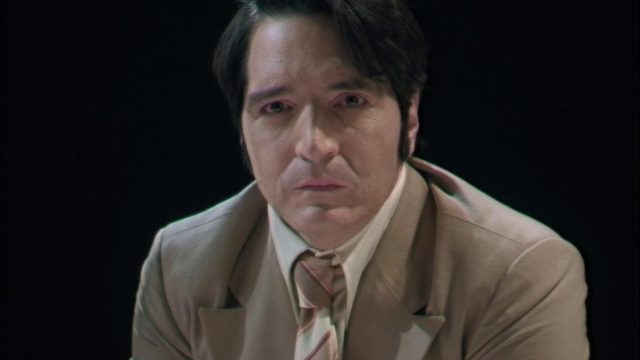It’s October, which means that for me, it’s the most wonderful time of the year. This will be a (nearly) non-stop horror month in my household, and I’m pleased to kick it off by writing about Colin and Cameron Cairnes’s Late Night with the Devil.
Late Night with the Devil manages the difficult trick of evoking a pleasant nostalgia and still feeling fresh. For much of its runtime, it purports to be a documentary account–and re-airing–of one failing late night talk show gone darkly haywire, with a brisk and entertaining recap of the show and its host’s history leading into the “real” broadcast from that night. It stretches the point by including what it insists is behind-the-scenes, backstage footage, which never feels as authentic as the main event, but it doesn’t actively break its own internal reality until the final act. That last part is a major slip, especially in this genre: after all, the way to defang a horror film is, as The Last House on the Left‘s marketing put it, “keep repeating, ‘It’s only a movie… Only a movie… Only a movie.'” You don’t need the movie itself suddenly reminding you of that, especially when it’s a mockumentary where the veneer of non-movie-like realism is part of the point. But while this is a big flaw in Late Night with the Devil, everything else is so much fun that I’m prepared to forgive it.
A superb David Dastmalchian stars as Jack Delroy, whose show Night Owls has been a perennial also-ran in the late night wars. Jack is charming, funny, and connected–he’s a regular at “the Grove,” the real-life Bohemian Grove’s non-union equivalent, where the rich and powerful rusticate, trade favors, and possibly perform arcane rituals–but he’s no Johnny Carson. Once he was in a respectable second place, but he’s been sliding down the charts. His beloved wife died of cancer. His show is on the brink of cancellation. He’s a little brittle, maybe even a little desperate.
And it’s Halloween night. Jack’s betting everything on a spooky, occult-themed lineup: second-rate psychic Christou (Fayssal Bazzi), professional debunker Carmichael (Ian Bliss), and–best of all–parapsychologist June (Laura Gordon) and her demonic-cult-survivor ward, the unsettling Lilly (Ingrid Torelli).
Late Night with the Devil follows the show as it unfolds. The film is at its (very strong, very entertaining) best when it maintains an eerie, disconcerting ambiguity–we’re sure the supernatural is at work here, but where it’s coming from, what it wants, how it’s manifesting, and who’s responsible for it are all tantalizingly open questions with various suggested answers. This is also when the documentary format works best, because it captures a very realistic sense of uncertainty: the footage can’t lie, but it also can’t cover everything. We have to spend some time wondering and accepting the not-knowing, and that’s its own kind of horror. Did likable Jack make a literal devil’s bargain? Did he trade his wife’s health for his show’s success, only to lose twice-over? Does Lilly, who assures him of his impending fame, know what’s going to happen tonight? And who the fuck is the silent figure in the skeleton costume, watching all this unfold from its place in the studio audience?
The more the movie keeps its supernatural events plausibly deniable–or at least plausibly minimized–the more we can believe in its “lost footage” premise. It would work even better if Night Owls were a little more obscure in-universe, and this was all framed as a documentary about one alarming night on a nearly-forgotten public access show, the kind of thing that could plausibly be little-seen but much-discussed. (Possibly airing right after reruns of Candle Cove.) The movie leans into this for a while, creating scenarios that would be disturbing and provocative but not necessarily apocalyptic, not truly revelatory. It’s particularly good at this phase when it juggles the different philosophies of the people involved, so we can see the different angles the hardened skeptic, the devout Catholic, and the amoral producer all have to offer. It’s all hypnosis and manipulation, says the skeptic. Crew members are leaving, and this is going too far, says the Catholic (sweet on-air assistant Gus, played by Rhys Auteri). We should do this every week, says the producer.
Horror movies are almost universally better at building up tension than paying it off, and Late Night with the Devil is no exception to that rule. While it has a strong ending–in the sense of its last few frames–it has a weak final act, and, again, suffers from the collapse of its meta-narrative. But Dastmalchian is terrific, the 1977 TV studio setting is original and vividly evoked, and that tension does build up deliciously and is deeply enjoyable in its own right. This deserves to be a part of a lot of October movie marathons, and I can easily see it becoming a kind of seasonal classic.
Last Night with the Devil is streaming on Shudder.

